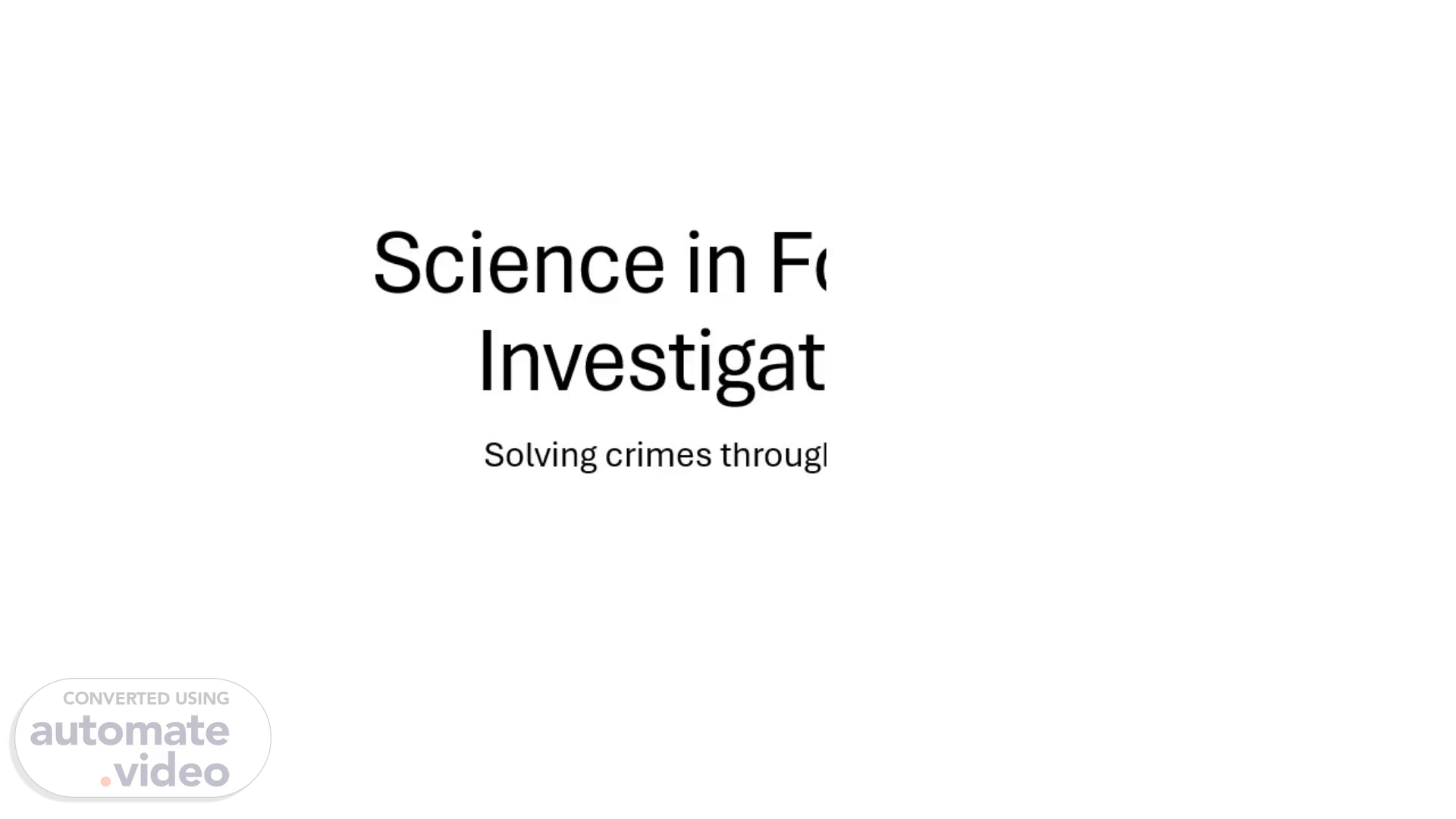
Science in Forensic Investigations
Scene 1 (0s)
Science in Forensic Investigations. Solving crimes through science.
Scene 2 (2m 18s)
Importance of Science in Forensic Investigations.
Scene 3 (2m 33s)
Main Roles in Solving Crimes. - Forensic Pathologist: Determines cause of death through autopsies and analysis of physical evidence - Forensic Entomologist: Estimates time since death using insect evidence and life cycles - Forensic Toxicologist: Analyzes toxins and drugs in body fluids and tissues to determine effects - Forensic Anthropologist: Identifies age, sex, and ancestry from skeletal remains to establish identity.
Scene 4 (2m 51s)
Forensic Pathologist. - Key role in determining manner of death, conducting autopsies, and collecting evidence - Provides critical insights into injuries, trauma, and medical conditions that may have contributed to death - Helps in establishing a timeline of events leading to the death of an individual.
Scene 5 (3m 5s)
Forensic Entomologist. Utilizes insect evidence to estimate time since death and aid in crime scene reconstruction - Studies insect colonization patterns on decomposing bodies to provide valuable information to investigators - Plays a vital role in cases involving outdoor crime scenes or bodies found in advanced stages of decomposition.
Scene 6 (3m 20s)
Forensic Toxicologist. - Analyzes body fluids and tissues for drugs, toxins, and poisons to determine toxicological effects - Helps in identifying substances that may have played a role in the death of an individual - Provides expert testimony regarding the presence and effects of drugs in the body.
Scene 7 (3m 34s)
Forensic Anthropologist. Examines skeletal remains to determine biological profile, age, sex, and ancestry of unknown individuals - Assists in identifying victims in cases of mass disasters, homicides, or missing persons investigations - Contributes to establishing timelines and reconstructing events based on skeletal evidence.
Scene 8 (3m 49s)
Notes:. [image].
Scene 9 (3m 55s)
The title slide introduces the topic of "Science in Forensic Investigations" with the subtitle "Solving Crimes Through Science." It emphasizes the importance of science in solving crimes through evidence-based analysis and conclusions. Various scientific methods are used to determine truth and uncover hidden details in criminal cases, with forensic science leveraging multiple disciplines to assist law enforcement in solving complex cases. The main roles in solving crimes are outlined on Slide 3, including the forensic pathologist, forensic entomologist, forensic toxicologist, and forensic anthropologist. Each role plays a specific part in the investigative process, such as determining the cause of death, estimating time since death, analyzing toxins and drugs in body fluids, and identifying age, sex, and ancestry from skeletal remains to establish identity. Detailed descriptions of the roles are provided for the forensic pathologist, entomologist, toxicologist, and anthropologist in subsequent slides. For example, the forensic pathologist conducts autopsies, provides insights into injuries and trauma, and helps establish timelines of events leading to death. The forensic entomologist uses insect evidence to estimate time since death, particularly in cases involving outdoor crime scenes or decomposing bodies. The forensic toxicologist analyzes body fluids for drugs and toxins, identifying substances that may have played a role in an individual's death. The forensic anthropologist examines skeletal remains to determine biological profiles and contributes to establishing timelines and reconstructing events. In the speaker notes, it is reiterated that science is a vital component in forensic investigations, enabling professionals to uncover crucial evidence and solve complex cases. The collaborative efforts of forensic experts, including pathologists, entomologists, toxicologists, and anthropologists, provide expert analysis and insights that are essential in criminal investigations..